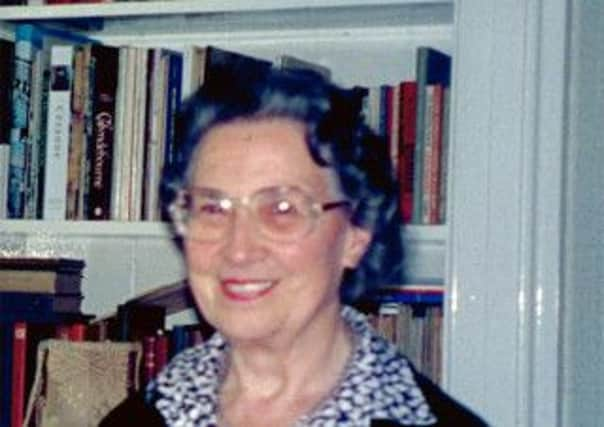Obituary: Mary Firth, pianist


The pianist Mary Firth died in Chamberlain Nursing home, Edinburgh, last September. We – her friends and students – want to celebrate her passionate commitment to musical education, her talent for friendship, intellectual curiosity, and her generous spirit.
The outline of her early life may be simply told: a childhood in the 1920s in West Yorkshire; scholarships to grammar school and to Edinburgh University in 1939 to study music; then post-graduate studies in Oxford.
Advertisement
Hide AdAdvertisement
Hide AdAt Edinburgh, two individuals were to be pivotal for her future life: the celebrated musician, composer and musical scholar Donald Francis Tovey; and George Firth, who had taught her music and who later became her husband.
George – a soldier, scientist, accomplished singer and first chairman of the Scottish Arts Council – recognised Mary’s outstanding talent as a performer and teacher. Marrying in 1947, they were active in Edinburgh’s vibrant post-war performing arts and classical music scene, giving leadership and support to various initiatives, including the newly formed Edinburgh Festival and, later, the Edinburgh Symphony Orchestra. Mary’s prodigious memory for names came to George’s rescue on many a social occasion.
Until George’s health deteriorated to the point where Mary’s continuous care was indispensable, she vigorously pursued a career in performance and teaching. She recorded for BBC radio, gave solo and chamber recitals (sometimes with her close friend the cellist and author Margaret Moncrieff), and regularly taught courses in musical analysis at adult education colleges – Attingham Park, Hawkswood and Stroud.
Mary was passionate about wider access to music appreciation. She was a close friend and staunch ally of the adult educationalist Sir George Trevelyan, both through Attingham Park and the Wrekin Trust, on which she served as trustee for many years.
Later on, teaching individual students at her home in Newington became a large part of her life. Scores of children, university and conservatoire students and adult returners sat at her beloved Steinway and were inspired by Mary’s skill, erudition and verve.
She was a natural teacher – glowing with interest in her subject, highly articulate, and sensitive to the student’s needs and talents. Nothing escaped her – we swore she could spot a false fingering at 100 yards, or so it seemed.
Mary was a prolific writer on music. She took her college students through large and difficult works, from Monteverdi to Wagner, and her analytical essays were models of clarity, insight and feeling. She developed and self-published exercises for piano technique. She edited George’s manuscript memoir on Tovey and organised its posthumous publication in 2006. (Her remaining Tovey papers have been gifted to the University of Edinburgh’s archive.)
She met many celebrated musicians and composers of the 20th century including Britten, Dohnányi, Menotti, Solomon and Casals and usually had a good story to tell about each. We hung on her words, linking us to a vanished world.
Advertisement
Hide AdAdvertisement
Hide AdMary’s life was also one of strong friendships, unobtrusive but regular charitable giving (students who happened to pick up her mail would almost invariably see correspondence from some good cause that she supported), and wide-ranging interests in literature and the arts.
In her 80s, she began studying modern Greek. After George’s death, she travelled several times to Greece and to Turkey, making a close study of many archaeological sites. Laughter with others and delight in the natural world were never far from her daily life. Even in her 90s, and when dementia had already taken hold, she would brighten at the word “party”.
To the end, wonderfully supported by staff in the nursing home, she maintained her grace, courtesy and dignity. Those of us whose lives were touched by her talent and warmth have a store of precious memories.
We recall her exclaiming with pleasure at fields of daffodils. We picture her in her chartreuse silk evening gown at a Festival reception. We hear her serene morning practice drifting up to her neighbours’ flat, offering them a daily concert. We remember the Greek edition of Harry Potter on her side table, alongside the poetry of Cavafy, studies of the archaeological finds at Vergina, and Oliver Sachs’ Musicophilia. We see her careful annotations on her volumes of Bach and Beethoven – her life’s loves. She allowed herself few personal luxuries, but in her gifts to music and to her students and friends she was unstinting and unforgettable.